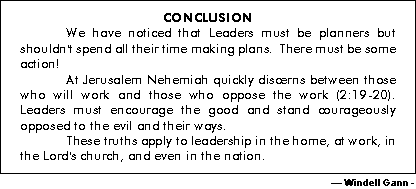

FROM
CUPBEARER TO LEADER
The main theme of the book of Nehemiah is 'Leadership.' Supporting this overall theme are the many subpoints that deal with qualities needed in good leadership.
1. Leaders Must Be Trustworthy-- 1:11
We learn in 1:11 that Nehemiah was the "cupbearer" for King Artaxerxes. He was perhaps the most trusted man in the king's service. It was his responsibly to see to the food and drink of the king. He had to be a man the king trusted would not poison him. (I Timothy 3:7).
2. Leaders Must Forget Self-- 2:1-4
After the visit by the Jerusalem delegation Nehemiah prayed for four months about the condition of things in Jerusalem. During this time he mourned and fasted. His countenance was not the same perfection of pleasantness as before. It was vital to be happy in the presence of the Persian king lest he think you were displeased with him and plotting against him. But Nehemiah forgot himself and appeared before the king with a sad countenance. Leaders must be willing to take their task to heart and forget self. (Matthew 16:24, Titus 1:7).
The king inquired whether Nehemiah had a request of him. And quickly, and silently, Nehemiah utters another short prayer to God. Then he told Artaxerxes of the reproachful condition of the city of his ancestors.
3. Leaders Must Be Planners-- 2:5-8
When we see the extent of Nehemiah's reply to the king's inquiry it becomes evident that he had been meditating about what it would take to get matters off dead center. He has been thinking about all that it would require it get the construction project done. Read verse 5-8 see the details
he had worked out.

When the king asked him how long he would be gone Nehemiah "set him a time." His plans were so definite that he had a time-table in mind. Goals (projects) should have a time-limit for their accomplishments.
Preparations were made to secure all the necessary supplies for the project. He had letters that would allow him to obtain the timbers and beams for the gates needed for the wall, the castle, and the temple, etc.
If one is ever looking for evidence that prayer changes things, notice how it prepared the heart of the king for Nehemiah's work, "And the king granted me, according to the good hand of my God upon me."
4. Leaders Wisely Survey the Situation -- 2:9-16
Nehemiah came to Jerusalem and waited three days. This suspense must have nearly killed the people and the opposition. What in the world was Nehemiah up to?! A man of this importance, escorted by officers and calvary of the king's army, coming to seek the welfare of the Jews brought sadness to their enemies.
In the darkness of night Nehemiah and only a few men surveyed the condition of the broken wall and burned gates. As yet he had told no one his purpose for coming. Nehemiah did not needlessly and prematurely arouse opposition.
A wise physician always makes a thorough diagnosis of his patient before he prescribes. Industrialists survey a town and all the necessary circumstances before locating a plant in a community. In like manner leaders must take stock of the current situation as Paul did (1 Cor.7:26).
That night Nehemiah must have been calculating what size of a labor force would be required, what materials would be needed, how much rubbish would have to be moved, and how to go about accomplishing the task that would bless the Lord's people.
5. Leaders Appeal For Helpers-- 2:17-18
Leaders realize they cannot do the job by themselves. Those who try to do everything will fail and do the Lord and the Lord's people a mis-service. "It is better to lead ten in working than to try do the work of ten men."
Even the apostles couldn't do it all! In Acts 6 they needed help and called upon the church for workers. Husbands need their wives and families. The boss needs his faithful employees. Life is a team effort.
6. Leaders Must Be Motivators-- 2:17-18, 20
Nehemiah had done all his homework, made his inspections and it was now time to discuss the matter with the people. He would need to inspire them, or motivate them. As we look at the details of his procedure leaders today can learn some valuable lessons about motivation.
a. Leaders must share information. Nehemiah called the people together and informed them why he had come to Jerusalem. People must have an understanding about a cause or work to become motivated over it.
b. The people must see the need. Nehemiah pointed out "how Jerusalem lieth waste, and the gates thereof are burned with fire" and stressed that the building of the wall was important so "that we be no more a reproach." (v.17)
c. The goal was made clear. The people knew clearly what they were working to accomplish. When the goals are fuzzy no one is motivated! It must become "my" goal, we don't get excited about the other people's goals.
d. Success was visualized. The people were able to see what it would mean to them to have the walls around their city again (v.20a). The steps necessary to accomplish the goal must be laid out, and each step realistically attainable. In Nehemiah's call "Let us rise up and build" he probably outlined what needed to be done first, second, and third. And they proceeded orderly; removing the rubbish, building the wall, setting the gates.
e. There must be enthusiasm for the goal. We can see and hear the enthusiasm in Nehemiah's voice as he speaks what must have become a rally slogan "...come, and let us build up the wall of Jerusalem" (v.17) and the people mirror his enthusiasm as they echo back "Let us rise up and build!" (v.18).
7. Leaders Must Identify With the People-- 2:17-18
Nehemiah did not think of this project as "his" work, nor was it a project he expect "them" to do. But he identified himself with them in building, "let us..."
As we shall later see Nehemiah was out there on the wall with them supervising the work. He didn't "send" them to the work, but he went with them.
8. Leaders Must Be Able to Handle Criticism-- 2:19-20
Sanballat, Tobiah and Geshem "laughed us to scorn, and despised us..." said Nehemiah. The KJV word here for "mock" is a word meaning "to utter repeatedly words of derision." The enemy sneered at Nehemiah saying "You're out of your mind. You'll never be able to do that!"
Nehemiah encourages us to not be defeated by opposition. Expect opposition, but don't let it defeat you! [Scripture] Teachers must teach what is true, right, and needful and not become discouraged by criticism.
9. Leaders Take God Into Their Plans-- 2:20
The way for leaders to not let opposition discourage them is to put their trust in the Lord and not in themselves. If it is "my" work, I might fail, but if it is the work of God, nothing can stop it if we will be faithful to it! (Acts 6:38-39).
